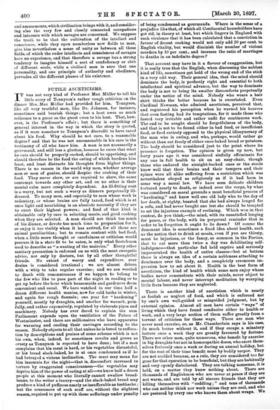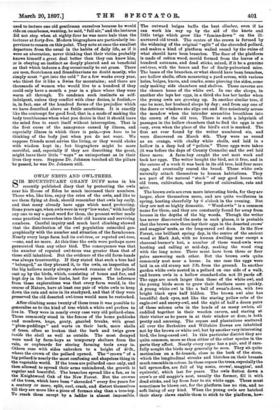FUTILE ASCETICISMS.
IT was not very kind of Professor Max Muller to tell his little story of Tennyson's rather rough criticism on the dinner Mrs. Max Midler had provided for him. Tennyson, like all very truthful men, like Dr. Johnson, for instance, sometimes said bearish things ; but a host owes as much reticence to a guest as the guest owes to his host. That, how- ever, is the Professor's affair ; bat there is something of general interest in the way in which the story is quoted, as if it were somehow to Tennyson's discredit to have cared about his food. Why should he not care, to a reasonable degree ? and that he was not unreasonable in his care is the testimony of all who knew him. A man is not necessarily a gourmand, and still less a glutton, because he cares that what he eats should be properly cooked, should be appetising, and should therefore be the food the eating of which burdens him least, and least distracts his thoughts from higher things. There is no reason in the world why men, whether average men or men of genius, should despise the cooking of their food. They never show, or are required to show, the same contempt towards any other art, and on no other is their mental calm more completely dependent. An ill-fitting coat is a worry, but not such a worry as dinners perpetually ill- dressed. To many men, and especially to men whose work is sedentary, or whose brains are fully taxed, food which is at once light and nourishing is an absolute necessity if they are to exert their highest powers ; and food of that kind is obtainable only by care in selecting meats, and good cooking when they are selected. A man should not think too much of his dinner, or devote too much time to preparation for it, or enjoy it too visibly when it has arrived, for all those are animal peculiarities ; but to remain content with bad food, when a little more thought or carefulness or criticism would procure it in a state fit to be eaten, is only what Scotchmen used to describe as " a wasting of the maircies." Every other sanitary precaution is enforced on us with the most energetic advice, not only by doctors, but by all other thoughtful friends. No extent of worry and expenditure over drains is considered irrational ; we are almost driven with a whip to take regular exercise ; and we are worried to death with remonstrances if we happen to belong to the few who like to pass part of the night in reading or to get up before the hour which housemaids and gardeners deem convenient and usual. We have watched in our time half a dozen different health manias, now for cold baths in winter, and again for rough flannels ; one year for " hardening " yourself, mostly by draughts, and another for warmth, pain- fully, and rather expensively, regulated by elaborate pipes and machinery. Nobody has ever dared to explain the sum Parliament expends upon the ventilation of the Palace of Westminster, and there are millionaires who have apparatus for warming and cooling their carriages according to the season. Nobody objects to all that unless he is bored to suffoca- tion by descriptions and praises of some scheme which is not his own, when, indeed, he sometimes revolts and grows as crusty as Tennyson is reported to have done ; but if a man complains that his meat is hard, or his vegetables distasteful, or his bread slack-baked, he is at once condemned as if he had betrayed a vicious inclination. The meat may mean for him insomnia for the night—that is, discomfort increased to torture by exaggerated consciousness—the vegetables may deprive him of the power of eating at all—we know half a dozen people at this moment who literally cannot swallow broad- beans, to the writer a luxury—and the slack-baked bread may produce a kind of puffiness nearly as insufferable as toothache ; but the consumers of such stuff are, without the slightest reason, required to put up with those sufferings under penalty
of being condemned as gourmands. Where is the sense of a prejudice like that, of which all Continental householders have got rid, in theory at least, but which lingers in England with such virulence that it has been calculated that a conviction in favour of decent cooking would not only add 20 per cent. to English vitality, but would diminish the number of violent murders by 10 per cent., and increase the ratio of marriages to deaths in an indefinite degree P That account may have in it a flavour of exaggeration, but it is really true that the English, when discussing the noblest
kind of life, sometimes get bold of the wrong end of the stick in a very odd way. Their general idea, that the mind should dominate the body, is perfectly right and essential to both intellectual and spiritual advance, but the way to dominate the body is not to bring its smaller discomforts perpetually under the notice of the mind. Nobody who wears a hair shirt thinks the better because he is excoriated. Even Cardinal Newman, who admired asceticism, perceived that, and registered his perception when he warned his hearers that even fasting had its temptations, for it made those who fasted very irritable and rather unfit for continuous work. The end to be sought should be forgetfulness of the body, and that is not to be found either in bad food, or insufficient food, or food entirely opposed to the physical idiosyncrasy of the man who is eating, and who, perhaps, would rather go without than eat freely of either once-baked bread or potatoes. The body should be considered just to the point where its presence is forgotten. The opinion is given up now, but forty years ago it was considered sinfully effeminate for any one in full health to sit on an easy-chair, though those who endured the straight-backed ones or the stools knew well that their brains and their tempers and their spines were all alike suffering from a restriction which was nevertheless obeyed as religiously as if it had been in some way a moral law. We have seen delicate children tortured nearly to death, or indeed over the verge, by what was considered on moral grounds a most beneficial process of " hardening," and knew well one old lady who to the day of her death, at eighty, boasted that she had always longed for a sofa, and had never bought one lest she should be tempted to set the injurious example of reclining. Which won in that contest, do you think,—the mind, with its unsatisfied longing for peace, or the body, with its perpetual reminder that in order to be forgotten it ought to lie down ? Of course the dominant idea is sometimes a fixed idea about health, such as the notion that to drink at meals, even if you are thirsty, must be injurious, or the fancy, so common in the Forties, that to eat more than twice a day was debilitating self- indulgence—that particular fad held captive and seriously impoverished the health of entire classes—but at bottom there is always an idea of a certain nobleness attaching to dominance over the body, and a completely erroneous im- pression how to set about it. Health is the best form of asceticism, the kind of health which some men enjoy whose bodies never remonstrate with their minds, never object to mental labour, and never interrupt meditation by worrying little frets because they are neglected.
There is another kind of asceticism which is nearly as foolish as neglect of food, and which is enforced not by one's own well-guided or misguided judgment, but by external opinion. Almost all men have certain " ways " of living which they have found conducive either to health or work, and a very large section of them suffer greatly from a torrent of criticism for those ways. There are men who never need exercise, or, as Mr. Chamberlain says is his case, do much better without it, and if they escape a minatory lecture once a week they are greatly favoured by fortune. There are other men, quite numerous, who benefit by exercise in big draughts but not in homoeopathic doses, who exert them- selves furiously once a week or during an annual holiday, but for the rest of their time benefit most by bodily torpor. They are not scolded because, as a role, they are considered too far gone for that operation to be beneficial, but they are habitually and very openly disbelieved. They are talking nonsense, it is held, on a matter they know nothing about. There are thousands of Englishmen who are never at peace if they are not warm, and are told by all sincere friends that they are killing themselves with "coddling ; " and tens of thousands who can neither think nor work unless they are cool, and who are pestered by every one who knows them about wraps. We used to lecture one old gentleman ourselves because he would ride on omnibuses, wanting, he said, "full air," and the lectures did not stop when at eighty-four he was more hale than the lecturer at forty-five. Modern biographers are particularly im- pervious to reason on this point. They note at once the smallest departure from the usual in the habits of daily life, as if it were an aberration, never thinking that their victim probably knows himself a great deal better than they can know him, or is obeying an instinct as deeply planted and as beneficial as that which induces a dog occasionally to eat grass. There are men, Scotchmen and Scandinavians no doubt mostly, who simply must " get into the cold " for a few weeks every year, who thirst for it like a Swiss for mountains ; and there are thousands of women who would live to a hundred if they could only have a month a year in a place where they were warm all through. To condemn such instincts as self- indulgent, unless they conflict with clear duties, is foolish,— is, in fact, one of the hundred forms of the prejudice which we have described above as futile asceticism. It is exactly like the contempt for good food, that is, a mode of making the body troublesome when what you desire is that it should leave the mind free to exert itself without interruption. That is the first curse of the annoyance caused by illness, and especially illness in which there is pain,—you have to be thinking of the body just when you do not want. We suppose friends must advise the living, or they would choke with wisdom kept in ; but biographers might be more merciful, and, especially if they are describing the great, might leave their little " ways " as unimportant as in their lives they were. Suppose Dr. Johnson touched all the pillars he passed, he was Dr. Johnson still.







































 Previous page
Previous page